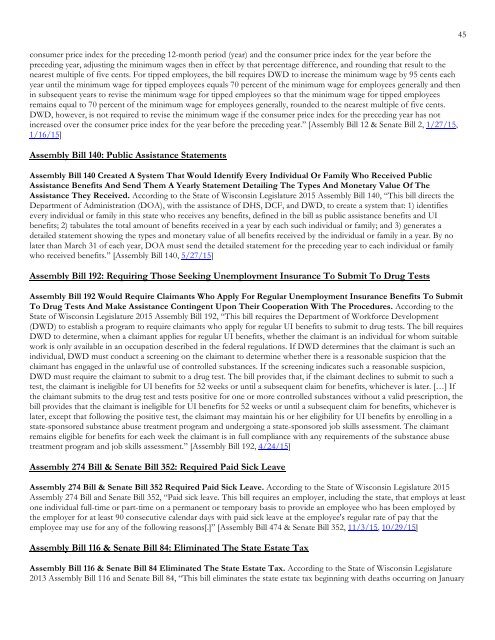Wisconsin-Report
Wisconsin-Report
Wisconsin-Report
Create successful ePaper yourself
Turn your PDF publications into a flip-book with our unique Google optimized e-Paper software.
consumer price index for the preceding 12-month period (year) and the consumer price index for the year before the<br />
preceding year, adjusting the minimum wages then in effect by that percentage difference, and rounding that result to the<br />
nearest multiple of five cents. For tipped employees, the bill requires DWD to increase the minimum wage by 95 cents each<br />
year until the minimum wage for tipped employees equals 70 percent of the minimum wage for employees generally and then<br />
in subsequent years to revise the minimum wage for tipped employees so that the minimum wage for tipped employees<br />
remains equal to 70 percent of the minimum wage for employees generally, rounded to the nearest multiple of five cents.<br />
DWD, however, is not required to revise the minimum wage if the consumer price index for the preceding year has not<br />
increased over the consumer price index for the year before the preceding year.” [Assembly Bill 12 & Senate Bill 2, 1/27/15,<br />
1/16/15]<br />
Assembly Bill 140: Public Assistance Statements<br />
Assembly Bill 140 Created A System That Would Identify Every Individual Or Family Who Received Public<br />
Assistance Benefits And Send Them A Yearly Statement Detailing The Types And Monetary Value Of The<br />
Assistance They Received. According to the State of <strong>Wisconsin</strong> Legislature 2015 Assembly Bill 140, “This bill directs the<br />
Department of Administration (DOA), with the assistance of DHS, DCF, and DWD, to create a system that: 1) identifies<br />
every individual or family in this state who receives any benefits, defined in the bill as public assistance benefits and UI<br />
benefits; 2) tabulates the total amount of benefits received in a year by each such individual or family; and 3) generates a<br />
detailed statement showing the types and monetary value of all benefits received by the individual or family in a year. By no<br />
later than March 31 of each year, DOA must send the detailed statement for the preceding year to each individual or family<br />
who received benefits.” [Assembly Bill 140, 5/27/15]<br />
Assembly Bill 192: Requiring Those Seeking Unemployment Insurance To Submit To Drug Tests<br />
Assembly Bill 192 Would Require Claimants Who Apply For Regular Unemployment Insurance Benefits To Submit<br />
To Drug Tests And Make Assistance Contingent Upon Their Cooperation With The Procedures. According to the<br />
State of <strong>Wisconsin</strong> Legislature 2015 Assembly Bill 192, “This bill requires the Department of Workforce Development<br />
(DWD) to establish a program to require claimants who apply for regular UI benefits to submit to drug tests. The bill requires<br />
DWD to determine, when a claimant applies for regular UI benefits, whether the claimant is an individual for whom suitable<br />
work is only available in an occupation described in the federal regulations. If DWD determines that the claimant is such an<br />
individual, DWD must conduct a screening on the claimant to determine whether there is a reasonable suspicion that the<br />
claimant has engaged in the unlawful use of controlled substances. If the screening indicates such a reasonable suspicion,<br />
DWD must require the claimant to submit to a drug test. The bill provides that, if the claimant declines to submit to such a<br />
test, the claimant is ineligible for UI benefits for 52 weeks or until a subsequent claim for benefits, whichever is later. […] If<br />
the claimant submits to the drug test and tests positive for one or more controlled substances without a valid prescription, the<br />
bill provides that the claimant is ineligible for UI benefits for 52 weeks or until a subsequent claim for benefits, whichever is<br />
later, except that following the positive test, the claimant may maintain his or her eligibility for UI benefits by enrolling in a<br />
state-sponsored substance abuse treatment program and undergoing a state-sponsored job skills assessment. The claimant<br />
remains eligible for benefits for each week the claimant is in full compliance with any requirements of the substance abuse<br />
treatment program and job skills assessment.” [Assembly Bill 192, 4/24/15]<br />
Assembly 274 Bill & Senate Bill 352: Required Paid Sick Leave<br />
Assembly 274 Bill & Senate Bill 352 Required Paid Sick Leave. According to the State of <strong>Wisconsin</strong> Legislature 2015<br />
Assembly 274 Bill and Senate Bill 352, “Paid sick leave. This bill requires an employer, including the state, that employs at least<br />
one individual full-time or part-time on a permanent or temporary basis to provide an employee who has been employed by<br />
the employer for at least 90 consecutive calendar days with paid sick leave at the employee's regular rate of pay that the<br />
employee may use for any of the following reasons[.]” [Assembly Bill 474 & Senate Bill 352, 11/3/15, 10/29/15]<br />
Assembly Bill 116 & Senate Bill 84: Eliminated The State Estate Tax<br />
Assembly Bill 116 & Senate Bill 84 Eliminated The State Estate Tax. According to the State of <strong>Wisconsin</strong> Legislature<br />
2013 Assembly Bill 116 and Senate Bill 84, “This bill eliminates the state estate tax beginning with deaths occurring on January<br />
45


